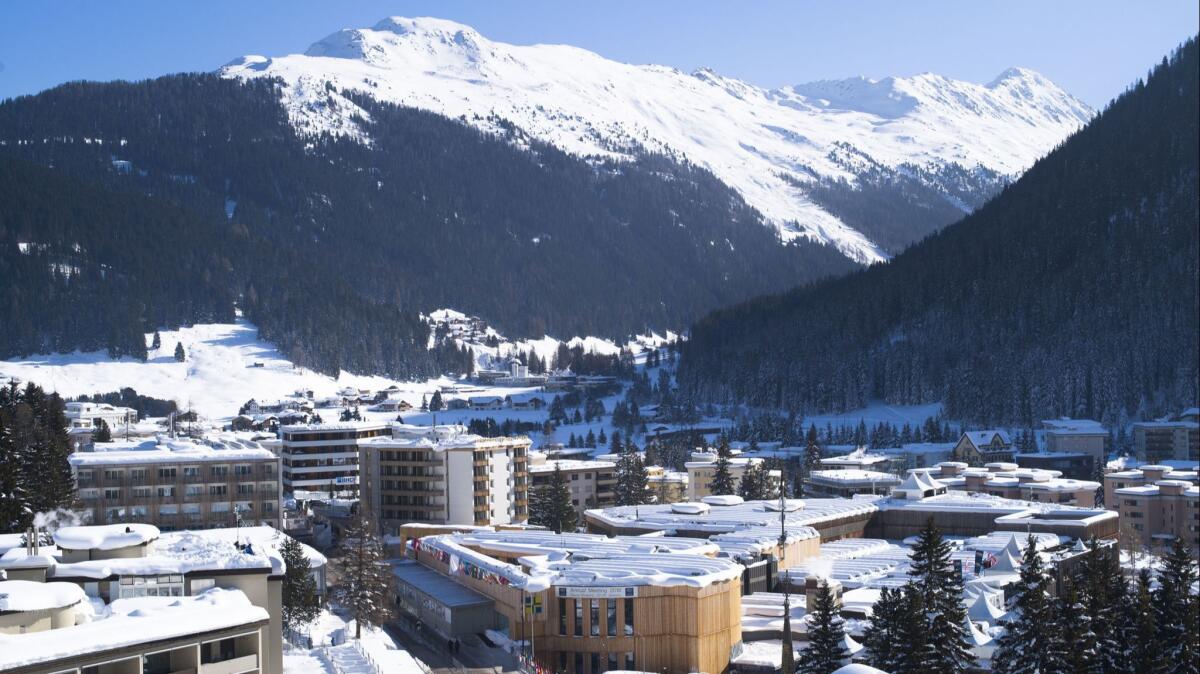What crisis? Fortunes of Davos billionaires surged since 2009

The global elite who descended on Davos are richer than ever.
A decade after the financial crisis poured flat champagne on the World Economic Forum, gold-collar executives who gathered in the Swiss town last week have bounced back, and then some.
David Rubenstein has doubled his fortune since 2009. Jamie Dimon has more than tripled his net worth. And Stephen Schwarzman has increased his wealth sixfold.
It’s a remarkable showing given the economic and political tumult of the last decade, from Lehman Bros. to Brexit to Donald Trump. The fortunes of a dozen 2009 Davos attendees have soared by a combined $175 billion, even as median U.S. household wealth has stagnated, a Bloomberg analysis found.
The data illustrate the ever-widening gap between the true haves — those in the 0.1% — and the have-nots of a global economy. UBS and PwC Billionaires Insights reports show that global billionaire wealth has grown from $3.4 trillion in 2009 to $8.9 trillion in 2017. A report from Oxfam last week revealed that the poorest half of the world saw their wealth fall by 11% last year.
Central bank actions to fight the financial crisis — record low interest rates and bond-buying programs — have underpinned this ballooning wealth by driving up the prices of stocks and other assets.
“Ten years ago, ironically at the lows of the market, what you wanted to own was capital and if you did own capital you did incredibly well,” said Michael Hartnett, Bank of America Corp.’s chief investment strategist.
It means the conference’s attendees — overwhelmingly male — exert more authority and visibility than ever.
Dimon was returning to the forum with JPMorgan Chase & Co. larger and more profitable than ever. Schwarzman has built Blackstone Group into the world’s largest alternative asset manager with $457 billion of assets as of Sept. 30, 2018, up from $95 billion at the end of 2008.
And Davos remains as popular as ever. The forum — titled Globalization 4.0 — attracted 3,000 people. George Soros hosted a dinner at which he spoke and Dimon’s JPMorgan threw a cocktail party. Bill Gates attended again, as did billionaire Carlyle Group co-founder Rubenstein.
Billionaire success was difficult to envisage a decade ago, when the gathering was marked by fear, anger and bitterness.
“Everyone I spoke to says it’s the grimmest Davos they’ve ever been to,” academic Kenneth Rogoff said at the 2009 meeting. “The mood has been very depressed.”
The intervening years have given attendees plenty of reasons for cheer. Business owners and financiers have benefited from the longest bull market in history while the benefits from an era of cheap money and recent U.S. tax cuts have largely flowed to the wealthy.
Even as the meeting’s reports and agendas have repeatedly flagged inequality as one of the chief risks to a stable society, the global economy’s bifurcation has only quickened.
“The financial crisis was the kind of event that shakes things out, but it didn’t happen 10 years ago,” said Anand Giridharadas, author of “Winner Takes All: The Elite Charade of Changing the World.” “The same rigging that caused the crisis ensured the losses were socialized.”
For those with minimal or no assets, it’s been a more challenging decade.
Wages have stagnated and although equity markets have risen, fewer U.S. adults are invested in the stock market than in 2009. Compensation for chief executives in America’s largest firms is now 312 times the annual average pay of the typical worker, compared with about 200 times in 2009, 58 times in 1989 and 20 times in 1965, according to a 2018 report by the Economic Policy Institute.
The recent turmoil in the stock markets means some attendees may have had discomfiting flashbacks to 2009. U.S. stocks in 2018 had their worst year since the financial crisis and oil ended the year mired in its steepest quarterly slump since 2014. And plenty of risks loom this year, including the U.K.’s impending exit from the European Union, U.S.-China trade talks and the showdown between President Trump and Congress over the budget.
It’s possible this means the Davos powwow has peaked. Bank of America’s Hartnett detects a transition in which “Joe Six Pack” will benefit relatively more as central banks withdraw easy money, populist politicians win at the ballot box and nationalism tops globalization.
“Wall Street has done worse lately while Main Street has done better,” he said. “You’re going to be in that world for the foreseeable future, and I can only see that world accelerating.”
If the last decade is any guide, don’t bet on it.
More to Read
Inside the business of entertainment
The Wide Shot brings you news, analysis and insights on everything from streaming wars to production — and what it all means for the future.
You may occasionally receive promotional content from the Los Angeles Times.










